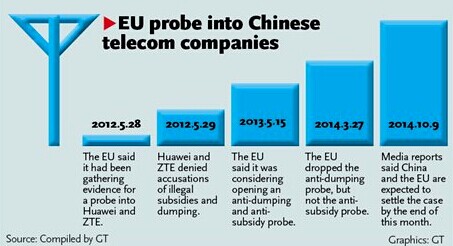

Report suggests possible compromise
It would be good for both China and the EU if the latter agreed to drop its anti-subsidy probe into imports of Chinese mobile telecommunications network equipment, experts said Thursday, after a report said the two sides are expected to settle the case by the end of the month.
EU Trade Commissioner Karel De Gucht is ready to drop an investigation into government subsidies to Chinese makers of mobile telecom network equipment, so long as China makes some concessions, Reuters reported late Wednesday, citing sources.
The "concessions" by the Chinese side are expected to include limiting export credits for telecom equipment makers and agreeing on monitoring the market share of Chinese telecom companies in Europe and that of European companies in China.
The EU announced on May 15, 2013 that it was considering opening an anti-dumping and anti-subsidy probe into Chinese telecom equipment firms, primarily Huawei Technologies Co and ZTE Corp. But it did not officially launch the probe, in order to "allow for negotiations toward an amicable solution," according to an EU press release in May 2013.
Neither Huawei Technology nor ZTE were available for comment by press time. But the companies have both previously denied that they were receiving government subsidies.
The Ministry of Commerce (MOFCOM) did not reply to the Global Times' request for comment by press time.
China's exports of telecom network equipment to the EU market are worth just over 1 billion euros ($1.27 billion) per year, according to the EU press release in 2013.
Experts say the timing of the report is important, as Chinese Premier Li Keqiang is currently visiting Europe, accompanied by a large business delegation with executives from over 30 Chinese companies.
"The two sides' trade dispute over dumping and subsidy concerns regarding solar panels made by Chinese companies came to an end shortly after Premier Li's visit to Europe in June 2013," said Bai Ming, a research fellow at the Chinese Academy of International Trade and Economic Cooperation under MOFCOM.
"So the timing of the report this time could also be seen as an indication that the EU wishes to solve the matter," Bai said.
Concerns in the EU stemmed from the fact that the Chinese telecom companies are expanding particularly quickly in Europe.
The EU Commission believes Huawei's rapid rise in the European telecom equipment market - from a 2.5 percent market share in 2006 to a 25 percent share today - could only be the result of illegal government aid, Reuters reported, citing an EU document.
The same document also said the prices of Huawei and ZTE products are 18 percent cheaper than those of EU products, hurting local firms' profitability.
Bai said the idea of monitoring the market share of Chinese companies seemed unfair.
"Years ago, when big European companies make robust expansion in China and reaped millions of euros in profit, I did not see them asking for monitoring of their market share," Bai said Thursday. "Now the wheel of fortune has turned and they are asking China to do what they have not done in the past."
"But China is not likely to give in simply to pacify the EU, which is frustrated to see its companies losing market share on their home turf," Bai noted.
Even if China agrees to put a cap on the export credits for its companies - which is a perfectly legal and recognized practice worldwide - it would only be for pragmatic reasons, and out of respect for the mutual benefits of the two sides, Tu Xinquan, vice dean of the China Institute for WTO Studies, told the Global Times Thursday.
"But it would still be giving up something that is perfectly just and lawful, which would be a pity," Tu said.
However, in pragmatic terms, China would still gain from a reconciliation, Tu noted. If the talks fail and the EU launches a probe, it would be hard for China to prove its innocence, as the standards for defining government subsidies are down to the EU's own interpretation, Tu explained.
The EU version of subsidies could include cheap credit offered to the companies or land acquired by them at discounted rates, he said.
"Even if China were to win a WTO ruling [on the matter], it would still face years of waiting before reparations would be made," Tu said.
Merkel opposes EU probe into Chinese telecom products
2013-05-28EU telecom probe 'hurts interests of both sides'
2013-05-22China warns EU against trade probe into telecom equipment
2013-05-22EU escalating telecom dispute to harm trade ties
2013-05-21Telecom giants face EU investigation
2013-05-17EU telecom threat fuels trade tensions
2013-05-17Copyright ©1999-2018
Chinanews.com. All rights reserved.
Reproduction in whole or in part without permission is prohibited.